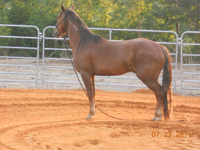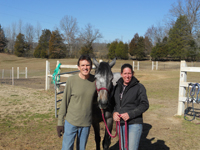
731.412.6196
Email Us
985 Foster Rd
Adamsville, TN 38310
Mustangs
"Wild Horse" is a misnomer; there have been no true wild horses on the American continent for 10,000 years. For some unknown reason they disappeared about that time with no known help from humankind. The Spaniards brought the first modern horses to America - mostly Andalusians and Spanish Barbs. Horses aided the Spanish immeasurably in subduing the indigenous people and sacking whatever wealth they might have had. Some of those horses escaped, and as more of the west was settleds horses escaped from ranches and unsuccessful ranchers simply turned the horses loose they couldn't take with them when they "starved out". All of those horses became feral horses. Often successful ranchers would turn out good stud horses to improve the quality of the herds from which they later gathered working horses.
Mustangs are simply mixed breed horses, nothing more, and nothing less. Because there were few predators the herds grew, and now in many places overgraze their range. Historically, ranchers in the west gathered the horses, kept the best, and sent the rest to the canners for dog food. There is no question that there were terrible abuses.
In 1971 at the urging of "Wild Horse Annie", The Wild horse and Burro Act was passed, recognizing that feral horses should have a place in the western ecosystem. Most of the horses that are on public lands are administered by the Bureau of Land Management. Since they are responsible for seeing that the range is not overgrazed, and are not permitted to send the horses to slaughter, the BLM has two choices, contrive to have them adopted, or store them until they die in feedlots or sanctuaries.
We are told by the BLM that many are adopted by well meaning, enthusiastic but inexperienced people who have never owned a horse or any other wild animal for that matter. In most cases they have no experience in caring for, or training horses. These horses are truly wild in the sense that, if they are not wary and not handled they can revert to the ways of traditional prey animals becoming feral and unpredictable. A 160lb English professor urged on by his wife who insisted on "saving" the Mustang is simply no match for a 1,000 Lb. prey animal whose escape instincts have been honed by 58 million years of not letting predators get near him, much less climb on his back. The result is, in many cases, those people quickly lose their enthusiasm and the horses become living lawn ornaments, usually overfed and under exercised and sometimes abused. We believe that only trained individuals should own horses, Mustangs and Domesticated included. There are many good trainers across the country dedicated to teaching the skills they have learned from others before them. At J&M, we have the proven knowledge to teach you the proper care of horses and how to properly interact on the ground and under saddle with these beautiful animals.
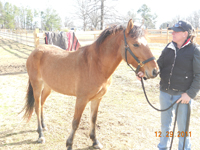
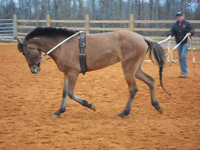
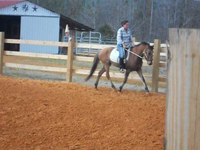
Lakota progressing through her training
At J&M, we believe that not every horse can be saved and turned into perfect equine partner, but we can ensure the environment they live in is free from abuse. We also believe in natural horsemanship where we prefer to gentle or desensitize a horse. In this context to gentle a horse means to make the horse gentle, as opposed to breaking a horse, which in its traditional meaning, means to break a horse's spirit. In desensitizing a horse we try to slowly condition horses to the things in our human world such as touching, barns, 4 wheelers, loud noises, kids, etc. Typically over the course of three months or so a domestic horse or Mustang can learn to lead, load in a trailer, walk, trot, and lope in a collected manner and become started in the skills required of a working horse. In 2011 J&M's head trainer, Jennifer Brown, proved that belief where she took a ungentled Mustang under training for 90 days before competing against other trainers in Murfreesboro, TN. This event, the Extreme Mustang Makeover, sponsored by the BLM and Mustang Heritage Fund, is held several times across the country each year to help raise awareness and find permanent homes for these Mustangs by auctioning off the trained Mustangs upon the conclusion of the event. Jennifer and her mustang "Foster" placed ninth overall and took home the Rookie Championship Award. Foster came home with us but since has moved to a new home with our good friends Pat and Dana who fell in love with him at the show and contacted us about adopting him.
Jalapeño on his first day of arrival
Through our growing number of contacts involved with the Mustangs we would be happy to hear from you if you
have an interest in adopting a Mustang or have one that needs a tune up.
In 2012 Jennifer competed again in the Extreme Mustang Makeover held October 19-21 in Clemson, South Carolina with Jalapeño, a small bay mustang. Though not placing in the "Top Ten" at this event Jennifer did come home satisfied with his performance. Jalapeño is now owned by Kaitlin and is boarded with here at J&M.
In January, 2013 Jennifer competed at the invitational only trainers challenge "Mustang Magic" at the Fort Worth Stock Show. It was an incredible experience with packed crowds for the three day event. There, Jennifer and her Mustang "Angel" a gray athletic mare, tied for tenth place after two days. However, the tie breaker did not go their way so she missed out on the freestyle final performance. Angel was adopted at the event by Paul who lives in Oklahoma.

